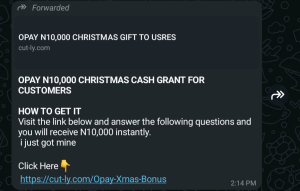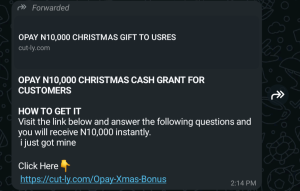As the holiday season approaches, cybercriminals ramp up their efforts to exploit unsuspecting victims with scams disguised as festive promotions. Recently, LinkGuard uncovered a phishing campaign centered around a fraudulent ŌĆ£Opay Xmas BonusŌĆØ offer, designed to trick recipients into divulging sensitive information. HereŌĆÖs a breakdown of the scam, its tactics, and how you can protect yourself.

The Lure: Opay Xmas Bonus
- The phishing campaign revolves around a message claiming that recipients are eligible for an ŌĆ£Opay Xmas Bonus.ŌĆØ The message directs users to a shortened URL (cut.ly) that supposedly leads to the bonus redemption page. The scam exploits the credibility of Opay, a popular mobile payment platform, and the excitement of holiday giveaways to ensnare victims.
- Fact-Check: Legitimate companies like Opay do not use generic URL shorteners like cut.ly for official promotions. They also announce such offers through verified channels, not random messages.

Phishing Tactics in Play
-
- Use of Shortened Links
The scam employs a cut.ly link to obscure the true destination of the URL. Clicking the link redirects users to a fake website designed to mimic OpayŌĆÖs official page.Fact-Check: URL shorteners are often used in phishing campaigns to hide malicious links. Always hover over links to verify their destination before clicking. - Fake Landing Page
The phishing site closely resembles OpayŌĆÖs official website, complete with branding, logos, and professional design elements. Users are prompted to enter personal and financial information to claim their ŌĆ£bonus.ŌĆØFact-Check: While the page may look convincing, its URL does not match OpayŌĆÖs official domain. Always verify website addresses before providing any information. - Urgency and Exclusivity
The message emphasizes that the bonus is time-limited, pressuring recipients to act quickly without questioning the offerŌĆÖs legitimacy.Fact-Check: Legitimate promotions provide clear terms and conditions and do not rely on urgency to compel action. - Social Engineering
The scam leverages the festive spirit and trust in Opay to manipulate users into sharing sensitive details. Once victims enter their information, it is harvested by the scammers for fraudulent activities.Fact-Check: Legitimate companies never request sensitive information like passwords or PINs through promotional offers.
- Use of Shortened Links

The Aftermath
Victims of the ŌĆ£Opay Xmas BonusŌĆØ scam may face consequences such as:
- Unauthorized transactions on their Opay or bank accounts.
- Identity theft using the personal information provided.
- Installation of malware on their devices if they downloaded any files from the phishing site.
.

How LinkGuard Uncovered the Scam
Using our phishing detection algorithms, LinkGuard flagged the cut.ly link as suspicious and analyzed the fake landing page. The investigation revealed:
- The page was hosted on a domain unrelated to Opay.
- The phishing siteŌĆÖs IP address was linked to other scams.
- The scammers used a combination of urgency, trust, and social engineering to exploit victims.
.

┬ĀProtect Yourself Against Phishing Scams
-
- Verify the Source: Check the senderŌĆÖs email address, phone number, or website URL for authenticity.
- Avoid Clicking Unknown Links: Hover over links to see their destination before clicking.
- Report Suspicious Activity: Notify Opay or your bank if you suspect fraudulent activity.
- Use Security Tools: Employ services like LinkGuard to identify and block phishing attempts.

LinkGuardŌĆÖs Verdict
The ŌĆ£Opay Xmas BonusŌĆØ phishing campaign is a textbook example of how scammers exploit trust and urgency during the holiday season. Stay vigilant, fact-check offers, and rely on trusted cybersecurity tools to keep your information safe.
Protect your digital lifeŌĆöthink before you click.

